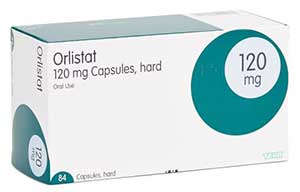Orlistat Diet Pills – Prescription Only
Orlistat is a weight loss drug that is prescribed by doctors and designed to be used in conjunction with a reduced calorie diet and exercise. It can be a very efficient weight loss provider, that’s why doctors prescribe it in the first place, but patients need to meet certain criteria before any doctor will consider prescribing Orlistat to help them lose weight.
What is Orlistat and How Does it Work?
 Orlistat is a medicine prescribed to help with weight loss. It serves no other function. Orlistat is the name of the active ingredient, not the name of the brand, and each capsule provides 120mg. It assists the weight loss process by blocking the action of the enzymes the body uses to break down and digest fat. It is very efficient at doing this and can block around 30% of ingested fat.
Orlistat is a medicine prescribed to help with weight loss. It serves no other function. Orlistat is the name of the active ingredient, not the name of the brand, and each capsule provides 120mg. It assists the weight loss process by blocking the action of the enzymes the body uses to break down and digest fat. It is very efficient at doing this and can block around 30% of ingested fat.
Fat is a high calorie nutrient. Each gram provides 9 calories. That’s more than double the amount of calories a gram of protein or carbohydrate contains, so the fat blocking ability of Orlistat can be very effective for lowering the amount of calories the body receives in a day.
Of course, that 30% of undigested fat has to go somewhere, so it passes through the intestines and exits the body with the stool, and its presence generally makes the stool softer and more greasy than normal.
[plain]Orlistat is available under the brand name Xenical – there is also a lower grade version called Alli[/plain]
Who is Orlistat for?
Doctors only prescribe Orlistat to patients who are obese and certain criteria must be met before any patient is considered a suitable candidate.
In order to be considered for an Orlistat prescription patients must:
- Be aged 28 or over.
- Have a Body Mass Index (BMI) that is 30 or higher.
- Have a medical condition, such as high blood pressure or diabetes, that would benefit from losing weight.
If a patient qualifies for an Orlistat prescription the doctor will provide advice on any necessary lifestyle changes (diet, exercise) and closely monitor their patient’s progress. If a patient fails to lose at 5% of their body weight within three months of taking the drug the treatment will be stopped. However, when patients prove to be responding well to the treatment it can be continued if necessary and, in the case of extremely obese individuals, it is feasible the treatment could go on for two years or more.

Suitability Issues
Even if all the necessary criteria for a prescription are met, Orlistat may still be an unsuitable option.
People who should not take Orlistat include:
- Women who are pregnant.
- Women who are nursing a child.
- People suffering from malabsorption syndrome (a condition where food is not absorbed correctly).
- People who suffer from cholestasis (a condition that interferes with the normal bile flow between the liver and the duodenum).
- People with kidney stones.
- Anyone with an underactive thyroid gland.
Orlistat can also interact badly with and/or reduce the effectiveness of certain medications.
[info]How to Take Orlistat – One (120mg) Orlistat capsule is required with breakfast, a second with lunch, and a third with dinner. Capsules can be taken up to 60 minutes before or after lunch, but users need to remember Orlistat works by blocking fats. It offers no other benefits. So if a meal is missed, or whenever a fat-free meal is chosen, the medicine will not be required.[/info]
Orlistat Side Effects
Some degree of stomach discomfort and/or wind cannot be entirely ruled out, but the main (for want of a better word) side effect users are likely to experience is greasy stools.
However, people who do not make a sensible effort to lower the amount of fat in their meals may regret the oversight. Nor should Orlistat be considered a cheat pill that provides a means to eat a high amount of fat without paying the consequences because eating too much fatty food while taking the drug will have consequences, and they may be very unpleasant.
Eating a higher amount of fat will give the drug more fat to work upon and its fat blocking action will cause an increased amount of undigested fat to pass through the intestines. Its greasy nature may cause the fat to move quite fast. At the best this may lead to an urgent need for the toilet. At the worst it could result in soiled underwear and/or unnecessary embarrassment. So any Orlistat user considering popping out for burgers and fries and then catching the bus home, needs to think twice.
Potential Orlistat users also need to be aware there are worries the drug may cause more dangerous side effects. Research conducted at the University of Rhode Island indicates the drug may have the potential to damage the liver and kidneys. The FDA has been informed and, although Orlistat remains available via prescription, the FDA has approved a revised label that includes a warning about liver damage.
